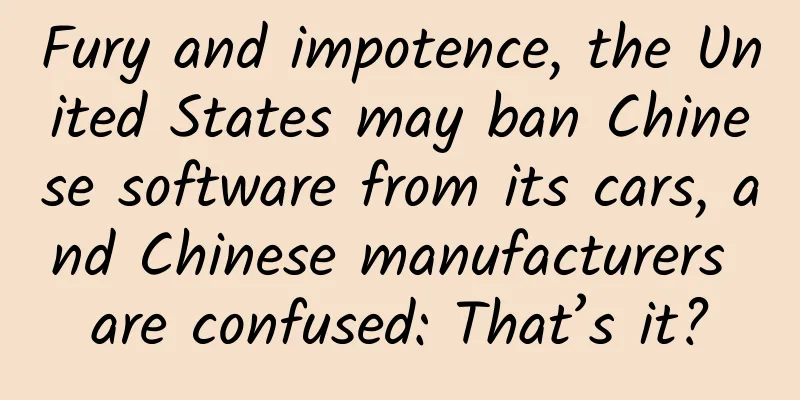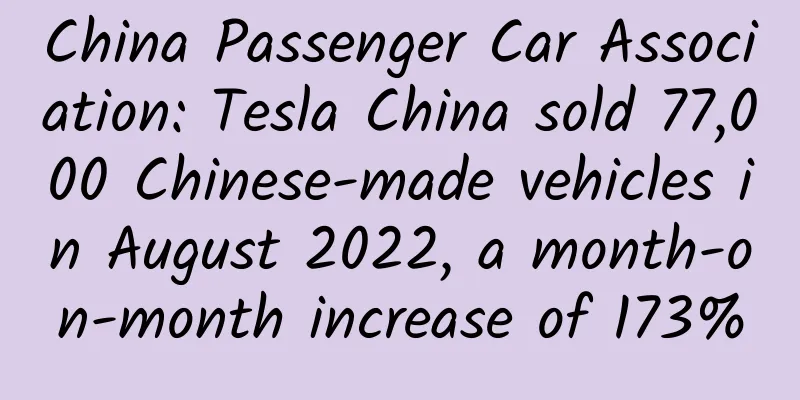Fury and impotence, the United States may ban Chinese software from its cars, and Chinese manufacturers are confused: That’s it?

|
From the other side of the ocean, known for its confidence, came news of lack of confidence recently, saying that it plans to propose a ban on the use of Chinese software in self-driving and connected cars in the coming weeks. According to people familiar with the matter, they will ban the use of Chinese software in their own L3 and above self-driving cars, and prohibit the testing of Chinese-made self-driving cars on their own roads. Not only that, they also plan to propose a ban on vehicles equipped with advanced wireless communication function modules developed by China from being on the road in the United States. How absurd is all this? Especially when Tesla is driving unimpeded on Chinese roads, it is even more ridiculous - where is the free trade promised, where is the technology without borders promised, why do you all keep silent when it is your turn to fall behind? In fact, as early as November last year, a group of parliamentarians in the country challenged us on this issue. At that time, Baidu, Weilai, Didi, and Xiaopeng were conducting autonomous driving tests in the country. According to information provided by these congressmen, Chinese companies have conducted 450,000 miles of test drives in California. In May this year, the country's Minister of Commerce Lei said that Chinese manufacturers would collect road condition information and user data when conducting tests in the country, which brought considerable security risks to the country. On May 14, the country announced that it would increase tariffs on imported electric vehicles from China to 100%. This tax rate basically blocked all Chinese new energy vehicle manufacturers from entering the country. Not only that, the country has also cut off supply to China in some key areas, such as Nvidia's high-end chips and ASML's lithography machines. From these series of measures, it can be seen that the country's suppression of China's new energy vehicles is comprehensive. The 100% tariff has destroyed the living space of Chinese manufacturers. The cost of China's new energy vehicles is much lower than that of European and American manufacturers, and even a 40% tariff can still guarantee profitability. However, a 100% tariff is equivalent to a direct sales ban on Chinese manufacturers. On the other hand, the country, which always talks about free trade, has begun to plan to not allow the use of autonomous driving software and 5G communication technology from China, cutting off its ties with China at the technological root. In fact, the country's new energy manufacturers also need these technologies, but the current decision-makers obviously can no longer take care of them. In this election year, they will first ban Chinese technology. Not adopting technology from China is a new move for the country to decouple from China. Their idea is very simple. First, they close their domestic market to Chinese manufacturers, then cut off the relationship between their domestic manufacturers and Chinese manufacturers, and finally achieve a hard decoupling from China's new energy vehicle industry. This is different from the European Union. On July 4, 2024, a tariff of 17.4%-38.1% will be imposed on Chinese electric vehicles, but this tariff is temporary and will not officially take effect until November. Moreover, there is also strong opposition within the EU. Germany has expressed its opposition many times, believing that it violates WTO principles and that European manufacturers will ultimately be harmed. In addition, the EU has repeatedly stated that these temporary tariffs are "negotiable" and hopes to negotiate with China to resolve the issue. In contrast, the EU's attitude is undoubtedly very different from that of the United States. In fact, the EU's imposition of tariffs on China is only to force Chinese manufacturers to invest and set up factories in the EU and transfer technology. The EU itself is not opposed to Chinese capital and technology, and even welcomes it. On July 8, BYD announced that it would invest $1 billion to build a factory in Turkey, and Turkey immediately announced the cancellation of tariffs on Chinese cars. Not only that, Hungary, Spain, Italy and even France are all vying for opportunities for Chinese manufacturers to invest and start businesses. The verbal battle between the two sides looks more like a bargaining match. The country's blockade of Chinese manufacturers seems a bit like a fit of anger, just like the "Wolf Act" they launched in the aerospace field, which ultimately backfired and caused their astronauts to float in space for several more months, and there is still no plan to rescue them. Judging from all these bills, electric vehicles don't seem to be that important to the United States. Because of this, they don’t care too much about whether electric vehicles in their own country have a future, so they dare to take strong measures against China’s new energy vehicles. The country is well aware that Chinese new energy vehicle manufacturers have too many advantages, and it will be difficult to stop their growth without taking extreme measures. Musk once said that only trade barriers can stop Chinese new energy manufacturers. Killing people all over the world, almost nothing But the question is, can erecting trade barriers really prevent the development of China's new energy vehicles? The answer is obviously no. When it comes to entering the US market, most Chinese new energy manufacturers have a "lay flat" mentality. In March this year, BYD Vice President Li Ke publicly stated that he had no plans to enter the US market. China's new energy vehicle sales have already occupied more than half of the global market, showing a "unique" trend. Moreover, this achievement was achieved in markets outside the United States. Mainstream new energy manufacturers have basically tacitly given up the US market. This is just like when Huawei phones were unable to enter the US market but still reached the top of the world - the country doesn’t care whether there are Chinese electric cars or not, and Chinese car manufacturers don’t care whether there is a US market or not. On the other hand, the country's initiative to cut off cooperation with China on new energy technology actually has very little impact on us. In the field of new energy core technology, China has an absolute advantage and does not care what attitude the country takes. There is an interesting phenomenon: the country has sanctioned so many Chinese technology companies, but has not sanctioned Chinese manufacturers such as BYD. This is because they have very low reliance on the country's technology and have extremely high autonomy in new energy core technology and supply chain. In this case, the country's sanctions seem meaningless. In fact, the most obvious shortcoming of China's manufacturing is high-end chips, but new energy vehicles are not so sensitive to high-end chips. It is not a mobile phone and does not require a 5nm process technology. Even 28nm can be used. It is worth noting that on August 2, the country's trade representative's office announced that the move to impose additional tariffs on Chinese electric vehicles, which was originally scheduled to take effect on August 1, would be postponed for at least two weeks due to domestic opposition. Let them toss about it, all this is no longer important to China. Going to great lengths to target Chinese new energy vehicles is only a kind of impotent rage, and this hysterical performance has no audience in the Chinese automotive industry. The rooster has stopped crowing, so is it possible that the day has not yet dawned? As a winner of Toutiao's Qingyun Plan and Baijiahao's Bai+ Plan, the 2019 Baidu Digital Author of the Year, the Baijiahao's Most Popular Author in the Technology Field, the 2019 Sogou Technology and Culture Author, and the 2021 Baijiahao Quarterly Influential Creator, he has won many awards, including the 2013 Sohu Best Industry Media Person, the 2015 China New Media Entrepreneurship Competition Beijing Third Place, the 2015 Guangmang Experience Award, the 2015 China New Media Entrepreneurship Competition Finals Third Place, and the 2018 Baidu Dynamic Annual Powerful Celebrity. |
<<: 360 Children's Watch 3S Preview: A Positioning Device for Children's Wrists
>>: Why are mechanical keyboards more popular than soft girls in the world of programmers?
Recommend
How long can eroticism, horror and bad taste sustain online movies?
On July 13, the online movie "The Scarecrow&...
Douban Photo Album Collection
Source code introduction The source code of Douba...
High-nickel batteries become a new track, and the power battery industry is still full of variables
With the help of favorable policies and subsidies...
What are the functions of exhibition mini program development? How much does it cost to develop an exhibition mini program?
A few days ago, a client consulted the editor. Th...
Build a simple hybrid cross-platform mobile app with Ionic
introduce Since hybrid mobile development became ...
Honor 60: A favorite among those who love appearance, a treasure for photographers
When Honor first started to "go it alone&quo...
Can the "super-Earth" outside the solar system become our new home?
Produced by: Science Popularization China Author:...
Xiaobai wants to run e-commerce operations? These points should be mastered
If a newbie in e-commerce wants to get started in...
Private domain traffic methodology!
In this article, we will share from the following...
Suning XiaoBiu speaker experience: The AI assistant that answers questions fluently also helps you remember the answers to all your questions
The rise of artificial intelligence has made the ...
Qualcomm + Huawei: Snapdragon 810 reaches 410Mbps!
Qualcomm announced today that it has successfully...
What do you learn in seo? How do beginners learn SEO?
SEO technology, most people know that companies n...
"Sleep for 12 hours after drinking it." This bottle of drink is regarded as a "sleeping magic tool" by netizens. Is it really effective?
"Anyone who has trouble sleeping should drin...
Wikimedia Foundation: AI crawlers cause Wikimedia Commons bandwidth demand to surge 50%
The Wikimedia Foundation, the management organiza...
Wu Mengchao and his wife, who had been together for 60 years, were buried together. Netizens: Thank you for coming
Yesterday (January 20) Academician Wu Mengchao, &...









